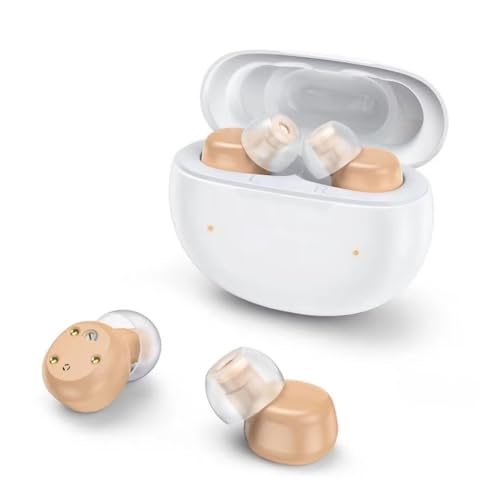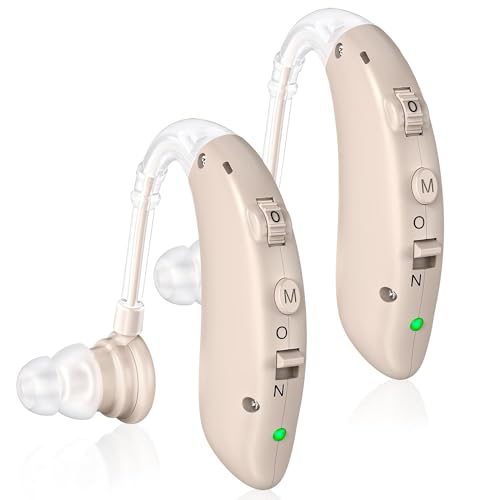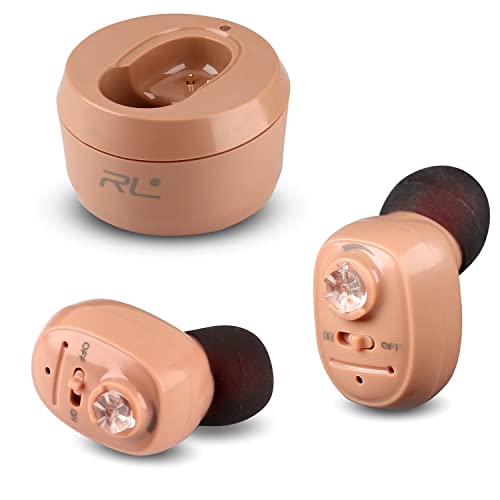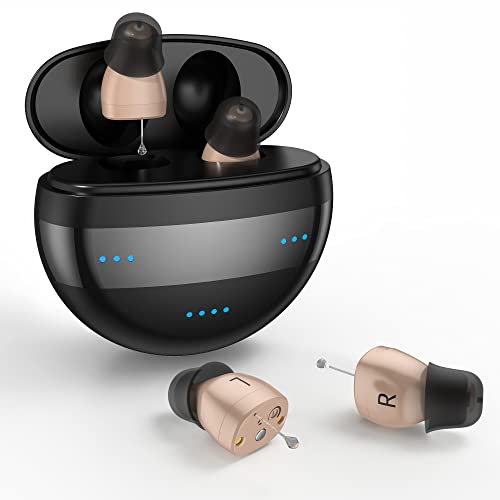Welcome to our comprehensive guide on the best hearing aids for dementia patients. Dementia is a condition that affects millions of individuals worldwide, causing cognitive decline and impacting various aspects of daily life, including communication. Hearing loss often coexists with dementia, further exacerbating communication difficulties. However, with the proper hearing aids specifically designed for dementia patients, improving their quality of life by enhancing communication and social interactions is possible.
I. Understanding the Challenges of Hearing Loss in Dementia
A. Exploring the Link Between Dementia and Hearing Loss
Dementia and hearing loss are often interconnected. Research suggests that individuals with dementia are more likely to experience hearing loss than those without dementia. The exact cause of this link is not fully understood, but it is believed that both conditions may share common risk factors or underlying physiological changes in the brain.
B. Impact of Hearing Loss on Dementia Patients
Hearing loss can significantly impact the daily lives of dementia patients. It exacerbates communication difficulties, leading to frustration, isolation, and withdrawal. Dementia patients may struggle to understand conversations, follow instructions, or engage in social interactions, further hindering their cognitive abilities and overall well-being.
C. Communication Challenges Faced by Dementia Patients
Dementia affects various cognitive functions, including language processing and comprehension. Combined with hearing loss, dementia patients face significant challenges in understanding speech, recognizing voices, and interpreting social cues. These difficulties can strain relationships with caregivers, family members, and friends, limiting their ability to participate in meaningful conversations actively.
D. The Importance of Addressing Hearing Loss in Dementia Care
Addressing hearing loss in dementia care is crucial for maintaining the quality of life and overall well-being. By improving communication abilities, individuals with dementia can remain connected to their surroundings, engage in social interactions, and experience higher cognitive stimulation. Hearing aids tailored for dementia patients enhance their communication capabilities and overall quality of life.
II. Key Considerations for Hearing Aids for Dementia Patients
A. Simplicity and Ease of Use
One of the essential factors to consider when selecting hearing aids for dementia patients is simplicity and ease of use. Dementia patients may struggle with complex controls or sophisticated features. Opting for hearing aids with user-friendly controls and intuitive functions ensures dementia patients can easily adjust settings and use their devices independently. Additionally, minimal maintenance and troubleshooting requirements simplify hearing aid management.
B. Comfort and Discreetness
Comfort and discreetness are crucial when choosing hearing aids for dementia patients. Lightweight and comfortable designs minimize discomfort and encourage consistent usage. Depending on individual preferences and hearing needs, options for in-the-ear and behind-the-ear styles should be explored to ensure a comfortable fit that meets their specific requirements.
C. Noise Reduction and Speech Enhancement
Hearing aids with advanced noise reduction and speech enhancement features are particularly beneficial for dementia patients. Adaptive noise cancellation technology helps reduce background noise, allowing individuals to focus on speech sounds. Speech enhancement features improve speech clarity, making it easier for dementia patients to understand conversations and engage in social interactions.
D. Personalization and Customization
Each dementia patient’s hearing needs are unique. Therefore, it is essential to consider hearing aids that offer personalization and customization options. Audiological assessments and individual hearing profiles can guide the customization process, ensuring that the hearing aids are programmed to address each patient’s specific hearing loss patterns. Programmable and adjustable settings allow for fine-tuning as the patient’s hearing needs to evolve.
III. Recommended Hearing Aid Brands and Models
A. Leading Brands in Hearing Aid Technology
Several leading brands specialize in hearing aid technology and offer solutions suitable for dementia patients. These brands have a proven track record of delivering high-quality hearing aids that prioritize functionality, ease of use, and innovation. Among the top brands in the industry are Phonak, Oticon, Widex, and ReSound.
B. Phonak Hearing Aids for Dementia Patients
The Phonak Audeo Marvel hearing aid offers a range of features and benefits ideal for dementia patients. This model ensures simplicity and ease of use with user-friendly functions and intuitive controls. Its connectivity options allow seamless integration with smartphones, televisions, and other audio devices, enhancing the listening experience.
The Phonak Bolero B hearing aid is known for its enhanced sound quality, making it suitable for individuals with more severe hearing loss. Its robust features and user-friendly controls provide a comfortable and efficient listening experience for dementia patients.
C. Oticon Hearing Aids for Dementia Patients
1. Oticon Opn S
The Oticon Opn S hearing aid offers an open sound experience, allowing dementia patients to hear and comprehend speech more effectively. Its connectivity and accessibility options enable seamless integration with various audio devices, providing a comprehensive and personalized hearing solution.
2. Oticon Ruby
The Oticon Ruby hearing aid is designed with user-friendliness in mind. It’s intuitive controls and reliable performance make it an excellent choice for dementia patients. With its user-friendly features, individuals can navigate their hearing aids with ease, promoting consistent usage and improved communication.
D. Widex Hearing Aids for Dementia Patients
1. Widex Evoke
The Widex Evoke hearing aid offers a personalized sound experience by adapting to the wearer’s environment and preferences. With its artificial intelligence integration, it continuously learns and adjusts settings to optimize sound quality for dementia patients, enhancing their communication capabilities.
2. Widex Moment
The Widex Moment hearing aid features natural sound processing, providing a comfortable and realistic listening experience. Its advanced technology reduces listening effort and enhances speech understanding, making it particularly suitable for dementia patients.
E. ReSound Hearing Aids for Dementia Patients
The ReSound LiNX Quattro hearing aid offers clear and balanced sound, allowing dementia patients to comprehend speech more easily. Its connectivity and remote control options provide convenience and accessibility, enabling individuals to customize their hearing experience per their preferences.
The ReSound ENZO Q hearing aid is designed for individuals with severe-to-profound hearing loss. Its powerful sound amplification capabilities ensure that dementia patients with significant hearing loss can effectively engage in conversations and connect with their surroundings.
Warning: unserialize(): Error at offset 235 of 1280 bytes in /home/newhopepsychology/public_html/wp-content/plugins/aawp/includes/product-helper-functions.php on line 135
IV. Additional Factors to Consider
A. Battery Life and Power Consumption
When choosing hearing aids for dementia patients, it is essential to consider battery life and power consumption. Opting for hearing aids with long-lasting batteries reduces the need for frequent changes and ensures consistent usage.
B. Warranty and Customer Support
Warranty and reliable customer support are essential factors when selecting hearing aids. Dementia patients may require ongoing assistance and support, and access to responsive customer service can ease potential concerns or issues.
C. Affordability and Financial Assistance Options
Hearing aids can be a significant investment. Exploring options that suit the budget while maintaining the desired features and quality is essential. Investigating potential financial assistance options, such as insurance coverage or government programs, can help alleviate the financial burden.
D. Consultation with Audiologists and Hearing Care Professionals
Consulting with audiologists and hearing care professionals is highly recommended when choosing hearing aids for dementia patients. These professionals can provide valuable guidance, conduct thorough assessments, and recommend appropriate hearing aids based on individual needs and preferences.
V. Supporting Dementia Patients with Hearing Aids
A. Caregiver Education and Communication Strategies
Caregivers play a crucial role in supporting dementia patients with hearing aids. Educating caregivers about the proper use and maintenance of hearing aids is essential. Communication strategies, such as speaking, visual cues, and minimizing background noise, can also significantly enhance communication effectiveness.
B. Regular Maintenance and Cleaning Tips
Regular maintenance and cleaning of hearing aids are vital to ensure optimal performance and longevity. Caregivers should be familiar with proper cleaning techniques and schedule routine maintenance appointments with hearing care professionals.
C. Encouraging Regular Use of Hearing Aids
Consistent and regular use of hearing aids is essential for maximizing their benefits. Caregivers should encourage and motivate dementia patients to wear their hearing aids consistently, emphasizing the positive impact on communication and overall quality of life.
D. Monitoring and Adjusting Settings as Needed
Hearing needs may change over time, and adjustments to hearing aid settings may be necessary. Caregivers should monitor the effectiveness of hearing aids and consult with hearing care professionals to make any required adjustments or modifications.
Conclusion
In conclusion, hearing aids can significantly enhance the communication abilities and overall quality of life of dementia patients with hearing loss. By understanding the challenges associated with hearing loss in dementia, considering key factors when selecting hearing aids, exploring recommended brands and models, and providing ongoing support and care, caregivers can empower individuals with dementia to maintain connections, engage in meaningful conversations, and enjoy a better quality of life. Remember, improving communication starts with choosing the best hearing aids for dementia patients.
Frequently Aksed Question
1. What are the best hearing aids for dementia patients, and how do they differ from traditional hearing aids?
The best hearing aids for dementia patients are designed to address their unique needs. They often differ from traditional hearing aids by offering simplified controls, easy maintenance, and enhanced speech clarity. These features aim to provide a seamless and user-friendly experience for individuals with dementia.
2. How can hearing aids improve the quality of life for dementia patients?
Hearing aids can significantly improve the quality of life for dementia patients by enhancing their communication abilities. Clearer hearing allows for better conversation engagement, improved social interactions, and reduced feelings of isolation. By reconnecting with their surroundings, dementia patients can maintain a sense of independence and actively participate in daily activities.
3. What features should I look for when selecting a hearing aid for my loved one with dementia?
When selecting a hearing aid for a loved one with dementia, look for features such as simplicity and ease of use, comfort, discreetness, noise reduction, speech enhancement, personalization options, and compatibility with telecare and remote control functions. These features can help ensure the hearing aid is user-friendly, comfortable, and optimized for effective communication.
4. How can hearing aids help dementia patients communicate and interact socially?
Hearing aids can help dementia patients with communication and social interaction by improving their ability to hear and understand speech. More precise hearing improves conversation comprehension, promoting engagement and reducing frustration. Enhanced communication skills can lead to increased social interactions and a higher quality of life for individuals with dementia.
5. Are there any specific brands or models of hearing aids that are recommended for dementia patients?
While specific brands and models may vary depending on individual needs, some recommended hearing aid brands for dementia patients include Phonak, Oticon, Widex, and ReSound. These brands’ recommended models may include Phonak Audeo Marvel, Oticon Opn S, Widex Evoke, and ReSound LiNX Quattro. However, it is essential to consult with a hearing care professional who can assess your loved one’s specific requirements and recommend the most suitable options.
Last update on 2025-03-31 / Affiliate links / Images from Amazon Product Advertising API







